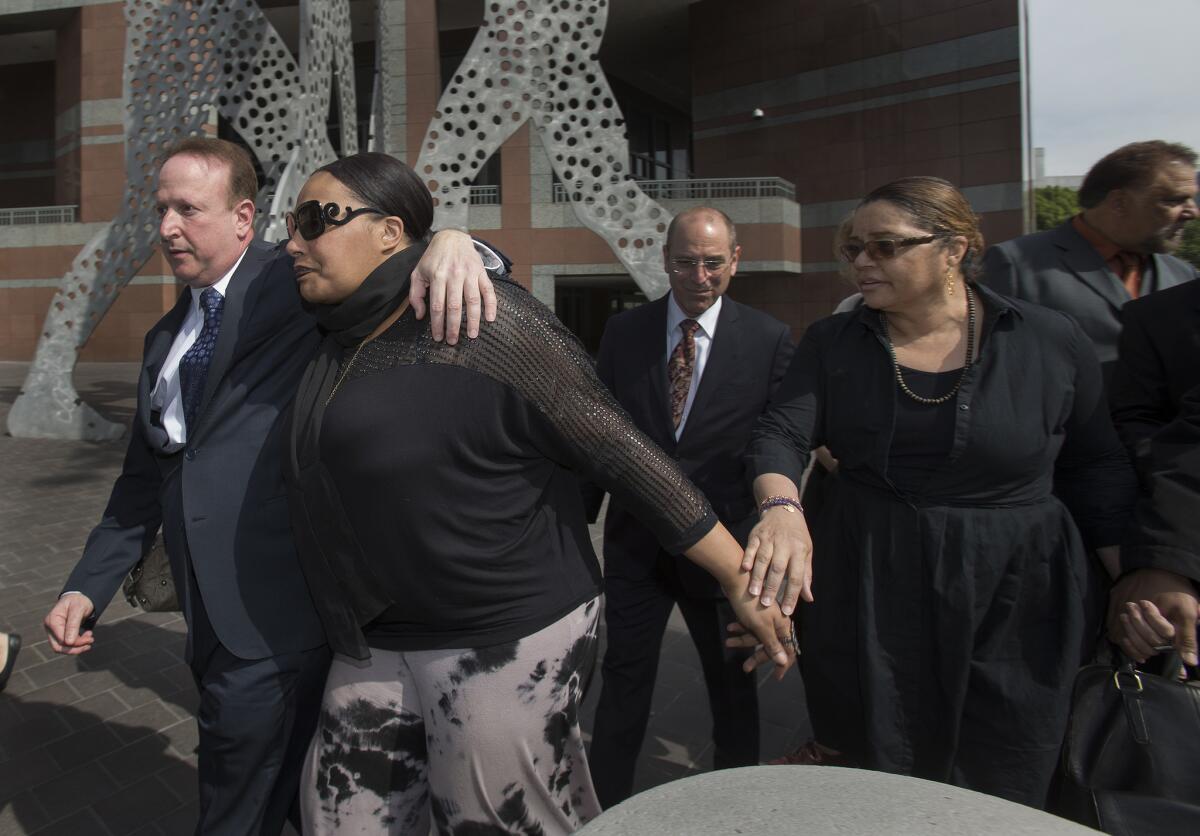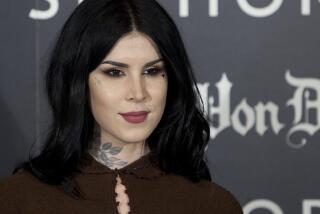Jurors hit Robin Thicke and Pharrell Williams with $7.4-million verdict

- Share via
A federal jury found Tuesday that the 2013 hit song “Blurred Lines” infringed on the Marvin Gaye chart-topper “Got to Give It Up,” awarding nearly $7.4 million to Gaye’s children.
Jurors found against singer-songwriters Pharrell Williams and Robin Thicke, but held harmless the record company and rapper T.I.
The verdict capped a trial that lasted more than a week and focused on the similarities between the song and the legendary soul singer’s 1977 hit.
The jurors began deliberating Thursday afternoon.
The Gayes contended that they instantly recognized striking similarities between the two songs when they first heard “Blurred Lines.” They called to the stand a musicologist who analyzed the songs and concluded there was a “constellation” of eight similar elements. Others outside court had also noticed similarities, including reviewers, fans and one person who overlaid the two songs for a mix uploaded to YouTube.
An attorney for the Gaye children, Richard Busch, said there were copied elements -- including the bass and keyboard line, the hook and a repeated theme -- in all but two bars of “Blurred Lines.”
Busch also repeatedly pointed to statements made by the credited writers of the song -- Thicke and Williams -- referencing the late Motown legend in interviews about their writing process. Thicke said in several interviews that he suggested to Williams that they write something like “Got to Give It Up,” and Williams has said he was “trying to pretend” he was Gaye when he wrote it.
Thicke, Williams and their attorneys brushed off the statements as casual remarks designed to sell a song -- and in Thicke’s case, made under the influence while he was drunk and high. Their attorneys asked jurors instead to believe what the musicians said on the witness stand: that Williams alone wrote the song with no input from Thicke, and that neither Gaye nor his song was discussed in the song’s creation.
Williams, who estimated that he’d written thousands of songs in his 20-year career, said the song may have had the “feel” of Gaye and the late ‘70s, but that the song was wholly original.
“As a creator, you get a kick out of bringing new things into the ether,” he testified.
Thicke, during his turn on the stand, played a medley of pop songs on a keyboard to demonstrate that many of them share the same chord progression and can sound similar. He painted a less-than-flattering portrait of himself, saying he’d lied repeatedly in interviews and in sworn legal documents, trying to claim credit for part of writing the song that had become the biggest hit of his career by far.
Busch, the Gayes’ attorney, cautioned jurors: “Keep in mind at all times, these people are professional performers.”
Also splayed out before jurors in a rare fashion were the financial details behind “Blurred Lines,” 2013’s biggest hit. The song brought in $5.6 million for Thicke, $5.2 million for Williams and another $5 million to $6 million for the record company, as well as an additional $8 million in publishing revenue.
Busch told jurors that if they decided that there was a “willful” infringement, they could consider profits before the $7 million in overhead costs that the record company spent to market and distribute the song and album.
Ironically, jurors never heard the full song “Got to Give It Up” during the trial. Because laws at the time allowed for only the sheet music composition, not the sound recording, to be copyrighted, U.S. District Court Judge John Kronstadt ruled that jurors could consider only what was noted on paper on file at the Library of Congress.
Instead, attorneys for Thicke, Williams and T.I. -- referred to in court by his legal name, Clifford Harris Jr. -- played a stripped down version, with Gaye’s vocals over a bass line and keyboard chords played by their musical expert.
The musicians’ attorney, Howard King, told jurors that there was more at stake in the outcome of the trial than the millions in profits.
“This affects the creativity of young musicians who hope to stand on the shoulders of other musicians,” he said. “Let my clients go forth and continue to do their magic.”
For more news on Los Angeles’ federal courts, follow @vicjkim.
More to Read
Sign up for Essential California
The most important California stories and recommendations in your inbox every morning.
You may occasionally receive promotional content from the Los Angeles Times.











